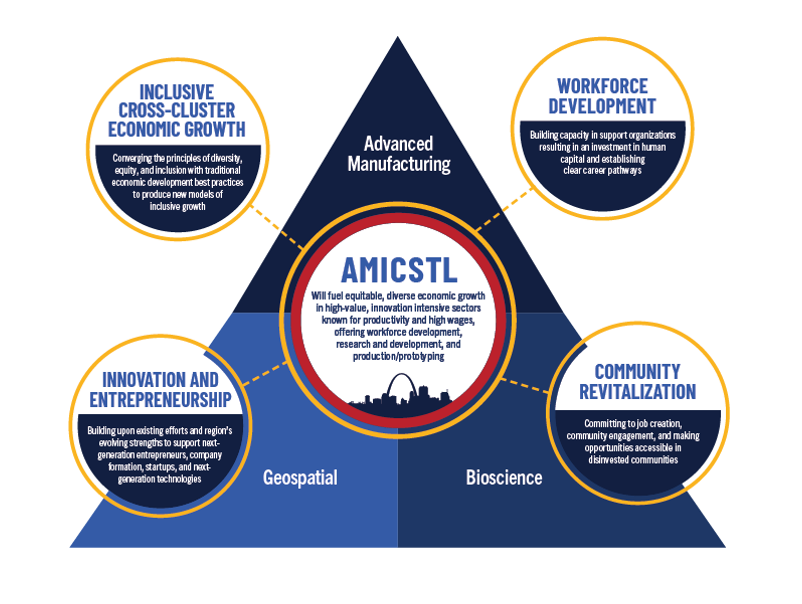Phase 2: Build Back Better Regional Challenge

The St. Louis Regional Advanced Manufacturing Innovation Center (AMICSTL) has submitted its proposal for the second phase of the Build Back Better Regional Challenge. The proposed advanced manufacturing center was named as one of 60 finalists in the regional challenge last December and is now in the running for up to $100 million.
The submission proposes the greater St. Louis Regional Tech Triangle (the “Tech Triangle”), which will leverage funds from the Build Back Better Regional Challenge to unlock the full potential of three distinct but related strength clusters in the region: advanced manufacturing, biosciences (medical and agriculture), and geospatial technology.
“We’ve got deep expertise in manufacturing and we ought to leverage that and we intend to,” said Kevin Cahill, vice president of strategic initiatives at the St. Louis Economic Development Partnership and board member of AMICSTL.
The Tech Triangle will create the conditions to bring together and spur innovation within the three sectors through a “hub and spoke” model that advances inclusive economic growth and resiliency. The hub, Advanced Manufacturing Innovation Center St. Louis (AMICSTL), will be a newly built innovation center located in disinvested North St. Louis City. The hub and spokes will provide strong anchors to the immediate community and broader region, accelerate regional job and wealth creation, and attract new business formation
Its “spokes” will focus on workforce growth and development, innovation and entrepreneurship, community revitalization, and overall cluster development and growth.
INCLUSIVE CROSS-CLUSTER ECONOMIC GROWTH
• Through the engagement of a variety of research and strategy firms, investments in this project will map out a long-term strategy for the manufacturing environment, identify strategies specific to capitalizing on AMICSTL, and create a strategy to reinvest in disinvested neighborhoods. This effort will also catalyze continued growth of the Tech Triangle’s three clusters.
WORKFORCE DEVELOPMENT
• Preparing Women for Advanced Manufacturing Careers: Rung for Women will identify talent gaps for middle-skill careers within advanced manufacturing, build training and credentialing programs with higher education partners to fill gaps, and recruit, prepare, and place women (70% women of color) in jobs with local employers.
• Advanced Manufacturing at Community Colleges: Component projects at St. Louis Community College and Southwestern Illinois College will expand existing programming and create new programs to provide quick credentials that supportadvanced manufacturing in the region, with access to training in Missouri and Illinois.
• Geospatial and IT Workforce and Apprenticeship Campus: Gateway Global will train youth and adult participants in new and next generation technology skills at its campus spanning two North St. Louis neighborhoods at the center of the burgeoning geospatial industry hub. Participants will earn industry recognized credentials and college credits; prep for employability and security clearance; gain hands-on experience through registered apprenticeships; and match with industry employers.
• Workforce of the Future: The clusters will work with the trades to further develop programs in high schools across the region with the academic supports to ensure minority students are prepared to enter apprenticeships in the skilled trades.
INNOVATION AND ENTREPRENEURSHIP
• Racial Equity in Innovation and Entrepreneurship: The project brings together four co-applicants (BioSTL, WEPOWER, Harris-Stowe State University, and Small Business Empowerment Center) to provide an array of entrepreneur and small business supports to advanced manufacturing firms; expand capacity at Harris-Stowe State University to serve as a hub for black entrepreneurship; and build specialized capacity to foster networks, supports, and capital to drive the creation and growth of businesses that provide manufacturing, logistics, and supply chain services across the biosciences sector (health, wellness, food, and nutrition). These services will support business growth across the bistate region, with a specific geographic focus on the emerging MLK Innovation District.
• Active Pharmaceutical Ingredient (API) Innovation Center @ Cortex: Located in the bioscience-focused innovation district, API @ Cortex will bring together pharmaceutical industry leaders, innovation partners in the start-up and entrepreneurship space, researchers from academic and industry partners, and critical workforce development programming to prepare diverse candidates for equitable opportunities in the API supply chain.
COMMUNITY REVITALIZATION
• MLK Innovation District: Construction of the Business Empowerment Center in the MLK Innovation District will focus on supporting the development of a robust innovation ecosystem in North St. Louis. This neighborhood transforming and spatial placemaking effort, adjacent to the AMICSTL hub, will shift the innovation ecosystem northward into parts of the city more accustomed to disinvestment than investment, furthering regional cooperation by building a geographically wider network.
Partners on the Greater St. Louis, Inc. proposal include: AMICSTL, BioSTL, Cortex Innovation Community, Donald Danforth Plant Science Center, East Central College, Economic Development Council of St. Charles County, Entrepreneur Startup Business Development Corporation (dba Arch Grants), Gateway Global American Youth and Business Alliance, Greater St. Louis, Inc., Harris-Stowe State University, Jefferson College, Lewis and Clark Community College, Missouri AFL-CIO, Ranken Technical College, Rung for Women, Saint Louis Public Schools, Small Business Empowerment Center, Southwestern Illinois College, St. Charles Community College, St. Clair County, Illinois, St. Louis Building and Construction Trades Council, St. Louis Community College, St. Louis Development Corporation, St. Louis Economic Development Partnership, St. Louis Makes, Technology Entrepreneur Center, Inc., and WEPOWER.
